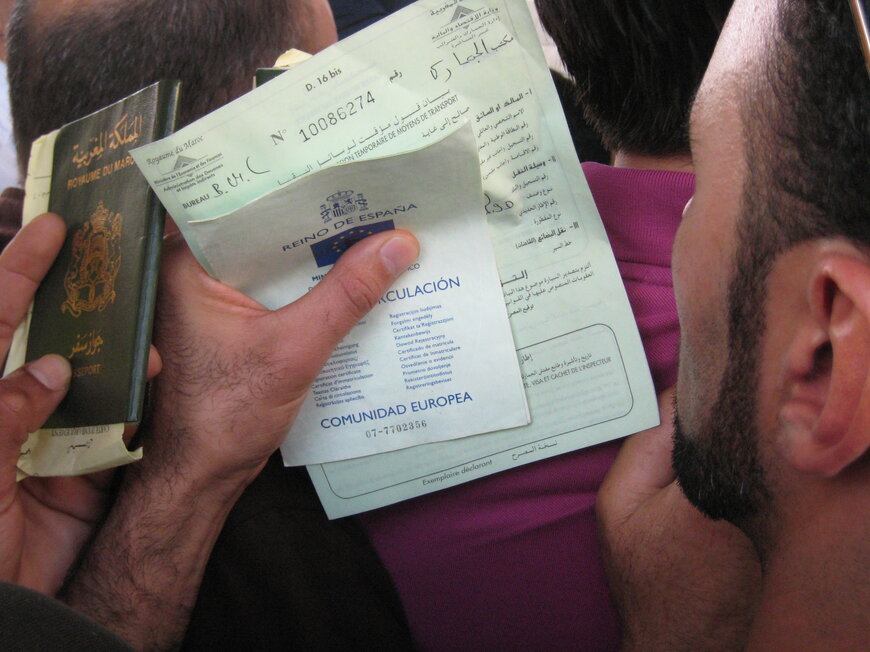Press releases
Recommendations for refugee protection in Germany \ Family knows no borders
Living in different countries at the same time is not an exception but the rule in the everyday lives of refugees. This is also evidenced by a new study that deals with the situation of refugees in Germany. TRAFIG practice note no. 10 recommends recognising and actively using the transnational (family) networks of displaced people to improve refugee protection.

Among the displaced Syrians, Eritreans and Afghans in Germany whom researchers in the EU-funded TRAFIG project interviewed, family relationships are particularly important. They shape their everyday lives significantly; be it because the interviewees were separated from close family members when fleeing or because their family networks were scattered transnationally across several countries.
“Despite their great importance for people’s lives, transnational relationships and the mobility of displaced people between countries are currently restricted rather than promoted”, analyses Dr Simone Christ, lead author of the study. She, therefore, recommends exhausting all legal options and incorporating family networks to improve refugee protection. “To avoid the painful separation of relatives for many years, faster and more transparent procedures for family reunification are urgently needed”, she emphasises. The authorities should also help applicants find solutions to formal bureaucratic obstacles, such as missing or unrecognised proof of identity or marriage. The authors believe that simplified procedures for transferring money and easing visa requirements also make good sense to promote transnational co-habitation and family visits.
"Family networks can also play a key role in the humanitarian admission of those seeking protection”, stresses Dr Benjamin Etzold, leader of the TRAFIG project. According to him, humanitarian admission programmes that build on the support by families and other civil society actors must be massively expanded. While this has already been announced in the coalition agreement of the new German government, now that the situation in Afghanistan, for example, has deteriorated dramatically, this intent must be put into practice quickly.
TRAFIG practice note no. 10 concludes: “Displaced people already use mobility and their transnational contacts as a way out of their protracted uncertainty; it is high time that this is recognised and that they are supported in this.”
A German language version “Familie kennt keine Grenzen – Was kann der Flüchtlingsschutz daraus lernen?“ is also available.
The recommendations of TRAFIG practice note no. 10 are based on the findings of the study (in English) TRAFIG working paper no.10 “Figurations of Displacement in and beyond Germany”. This paper presents the results of comprehensive empirical research on the role of transnational networks and mobility in forced displaced people’s lives in Germany.
The study has been published in the framework of the EU-funded Horizon 2020 research project "Transnational Figurations of Displacement" (Empfehlungen zum Flüchtlingsschutz in Deutschland \ Familie kennt keine Grenzen" (pdf, in German)
“Despite their great importance for people’s lives, transnational relationships and the mobility of displaced people between countries are currently restricted rather than promoted”, analyses Dr Simone Christ, lead author of the study. She, therefore, recommends exhausting all legal options and incorporating family networks to improve refugee protection. “To avoid the painful separation of relatives for many years, faster and more transparent procedures for family reunification are urgently needed”, she emphasises. The authorities should also help applicants find solutions to formal bureaucratic obstacles, such as missing or unrecognised proof of identity or marriage. The authors believe that simplified procedures for transferring money and easing visa requirements also make good sense to promote transnational co-habitation and family visits.
"Family networks can also play a key role in the humanitarian admission of those seeking protection”, stresses Dr Benjamin Etzold, leader of the TRAFIG project. According to him, humanitarian admission programmes that build on the support by families and other civil society actors must be massively expanded. While this has already been announced in the coalition agreement of the new German government, now that the situation in Afghanistan, for example, has deteriorated dramatically, this intent must be put into practice quickly.
TRAFIG practice note no. 10 concludes: “Displaced people already use mobility and their transnational contacts as a way out of their protracted uncertainty; it is high time that this is recognised and that they are supported in this.”
A German language version “Familie kennt keine Grenzen – Was kann der Flüchtlingsschutz daraus lernen?“ is also available.
The recommendations of TRAFIG practice note no. 10 are based on the findings of the study (in English) TRAFIG working paper no.10 “Figurations of Displacement in and beyond Germany”. This paper presents the results of comprehensive empirical research on the role of transnational networks and mobility in forced displaced people’s lives in Germany.
The study has been published in the framework of the EU-funded Horizon 2020 research project "Transnational Figurations of Displacement" (Empfehlungen zum Flüchtlingsschutz in Deutschland \ Familie kennt keine Grenzen" (pdf, in German)


